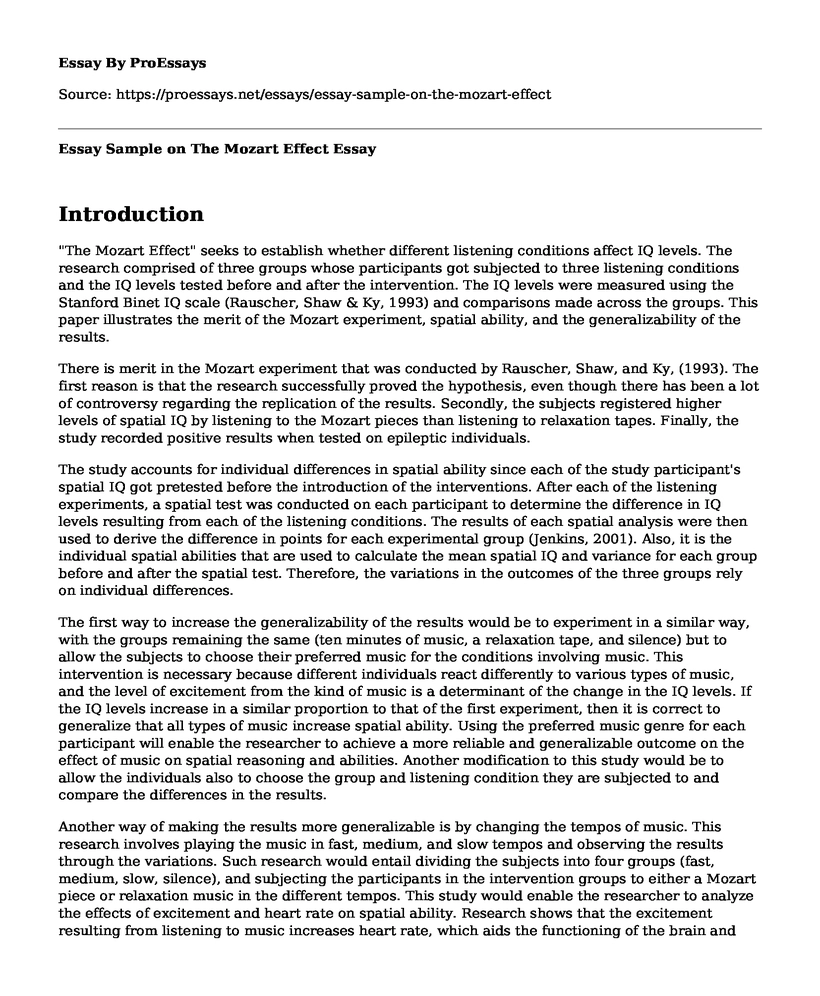Introduction
"The Mozart Effect" seeks to establish whether different listening conditions affect IQ levels. The research comprised of three groups whose participants got subjected to three listening conditions and the IQ levels tested before and after the intervention. The IQ levels were measured using the Stanford Binet IQ scale (Rauscher, Shaw & Ky, 1993) and comparisons made across the groups. This paper illustrates the merit of the Mozart experiment, spatial ability, and the generalizability of the results.
There is merit in the Mozart experiment that was conducted by Rauscher, Shaw, and Ky, (1993). The first reason is that the research successfully proved the hypothesis, even though there has been a lot of controversy regarding the replication of the results. Secondly, the subjects registered higher levels of spatial IQ by listening to the Mozart pieces than listening to relaxation tapes. Finally, the study recorded positive results when tested on epileptic individuals.
The study accounts for individual differences in spatial ability since each of the study participant's spatial IQ got pretested before the introduction of the interventions. After each of the listening experiments, a spatial test was conducted on each participant to determine the difference in IQ levels resulting from each of the listening conditions. The results of each spatial analysis were then used to derive the difference in points for each experimental group (Jenkins, 2001). Also, it is the individual spatial abilities that are used to calculate the mean spatial IQ and variance for each group before and after the spatial test. Therefore, the variations in the outcomes of the three groups rely on individual differences.
The first way to increase the generalizability of the results would be to experiment in a similar way, with the groups remaining the same (ten minutes of music, a relaxation tape, and silence) but to allow the subjects to choose their preferred music for the conditions involving music. This intervention is necessary because different individuals react differently to various types of music, and the level of excitement from the kind of music is a determinant of the change in the IQ levels. If the IQ levels increase in a similar proportion to that of the first experiment, then it is correct to generalize that all types of music increase spatial ability. Using the preferred music genre for each participant will enable the researcher to achieve a more reliable and generalizable outcome on the effect of music on spatial reasoning and abilities. Another modification to this study would be to allow the individuals also to choose the group and listening condition they are subjected to and compare the differences in the results.
Another way of making the results more generalizable is by changing the tempos of music. This research involves playing the music in fast, medium, and slow tempos and observing the results through the variations. Such research would entail dividing the subjects into four groups (fast, medium, slow, silence), and subjecting the participants in the intervention groups to either a Mozart piece or relaxation music in the different tempos. This study would enable the researcher to analyze the effects of excitement and heart rate on spatial ability. Research shows that the excitement resulting from listening to music increases heart rate, which aids the functioning of the brain and raises the levels of spatial IQ (Jenkins 2001). Therefore, an intervention of this nature would increase the generalizability of the results.
References
Jenkins, J. S. (2001). The Mozart effect. Journal of the royal society of medicine, 94(4), 170-172.Rauscher, F. H., Shaw, G. L., & Ky, K. N. (1993). Music and spatial task performance. Nature, 365(6447), 611.
Cite this page
Essay Sample on The Mozart Effect. (2022, Nov 21). Retrieved from https://proessays.net/essays/essay-sample-on-the-mozart-effect
If you are the original author of this essay and no longer wish to have it published on the ProEssays website, please click below to request its removal:
- Music Psychology Essay Example
- Formalism and Iconography Art Essay
- Targets (1968) Film Essay Example
- Composition of the Photography Essay
- DMX: From Baltimore to NYC Streets to Rap Star - Essay Sample
- Adapting Novels to Films: Literary Concepts & Aesthetic Justifications - Essay Sample
- Essay Example on Bergman's Films: Redefining Cinema With Chromatic Imagery and Naturalism







